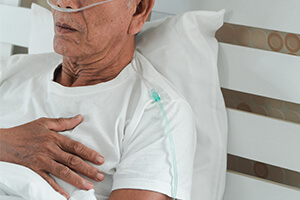Sepsis Injuries in Nursing Homes
 Sepsis is a serious condition that happens when the body has a severe response to an infection. This reaction causes inflammation throughout the body, which can lead to tissue damage, organ failure, and can be life-threatening if not treated quickly.
Sepsis is a serious condition that happens when the body has a severe response to an infection. This reaction causes inflammation throughout the body, which can lead to tissue damage, organ failure, and can be life-threatening if not treated quickly.
Sepsis is a medical emergency. Early recognition and prompt treatment with antibiotics and intravenous fluids are critical for improving outcomes and reducing the risk of complications.
Preventive measures include proper hygiene, timely vaccination, and effective management of chronic conditions to reduce the risk of infections that can lead to sepsis.
Call 505-677-7777 today to request a FREE case review.
What Are the Main Causes of Sepsis in Nursing Homes?
In nursing homes, sepsis often arises from infections that are not promptly or properly treated. The biggest causes of sepsis in nursing homes include:
- Urinary Tract Infections (UTIs): UTIs are common in the elderly, especially residents with catheters. When UTIs are ignored or untreated, the infection can spread to the bloodstream and cause sepsis.
- Respiratory Infections: Pneumonia and other respiratory infections are also common among nursing home residents. When nursing homes fail to manage these infections effectively, they can become severe and may lead to sepsis.
- Skin Infections: Bedsores (pressure ulcers), cuts and other open skin wounds have a higher risk of infection. Left untreated or unmonitored, they can progress to a more severe infection or sepsis.
- Gastrointestinal Infections: Infections in the gastrointestinal tract, such as those caused by clostridioides difficile (C. diff.), can also lead to sepsis if they become severe or spread.
- Invasive Devices: Devices like intravenous lines, catheters, and feeding tubes can introduce bacteria into the body, leading to infections that may cause sepsis.
- Surgical Wounds: Post-surgical infections can occur if wounds are not properly cared for, potentially leading to sepsis.
- Weakened Immune Systems: Many nursing home residents have a higher risk for developing sepsis because they have weakened immune systems due to age, chronic illnesses or medications.
Proper hygiene, regular monitoring and prompt treatment of infections are crucial steps nursing homes must take to help reduce the risk of sepsis in nursing home residents. Staff also need regular training on infection control practices. It is the nursing home’s duty to maintain a clean environment.
Which Residents Are More Likely To Develop Sepsis?
Residents with weaker immune systems, chronic illnesses or those who have recently undergone surgeries are more vulnerable to infections.
Residents with open wounds, such as bedsores, or those using catheters or intravenous lines also have a higher risk of developing sepsis. Other adults that are more prone to sepsis include residents who are malnourished or those with limited mobility.
Does Sepsis Have Any Warning Signs or Symptoms?
The most common symptoms of sepsis may include:
- Fever
- Chills
- Cool hands and feet
- Rapid breathing
- Elevated heart rate
- Confusion, lethargy, anxiety and irritation
- Significant pain or discomfort
- Change in the resident’s mental status
- Nausea/vomiting
Unfortunately, sepsis can set in and progress quickly, resulting in a significant drop in blood pressure. Sepsis can quickly progress to organ failure and death.
Contact PKSD New Mexico To Discuss a Case of Sepsis Due to Nursing Home Neglect
If nursing home neglect causes your loved one to develop an infection that leads to sepsis, you may be eligible to recover compensation for his or her damages.
At PKSD New Mexico, we have built a reputation as a fierce and committed advocate for victims who have been injured by nursing home neglect.
Contact our New Mexico nursing home abuse lawyers to find out about your potential legal options. We are here to help you.
PKSD New Mexico. Experienced Lawyers. Proven Results. Call 505-677-7777 today.

 Click To Call 24/7
Click To Call 24/7




